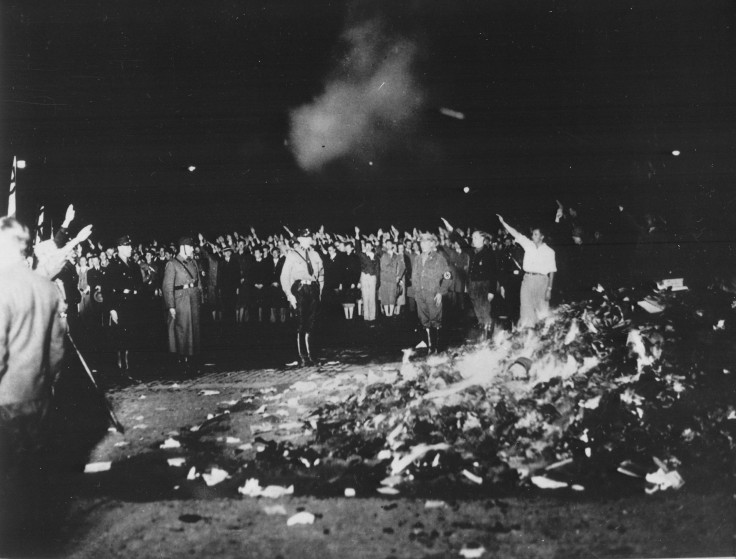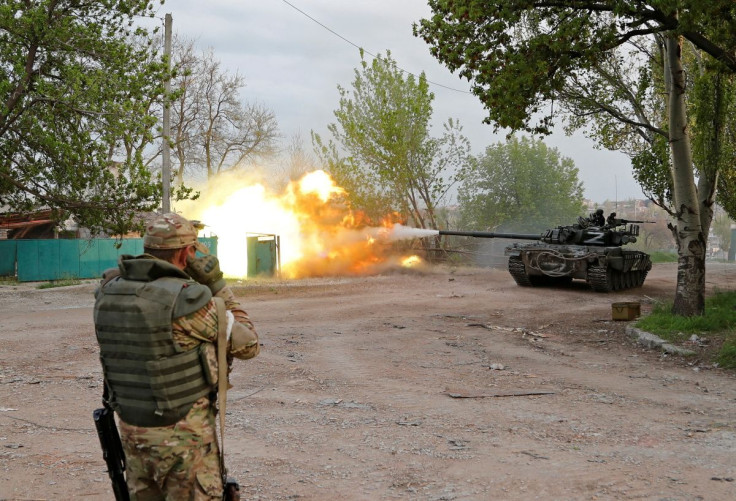Russian Soldiers Behaving Like Nazis, Destroying Ukrainian Books And Literature: Report
KEY POINTS
- The Russian military is deliberately destroying Ukrainian-language books in occupied areas of Ukraine, a political consultant claims
- They allegedly targeted textbooks and children's books, among other types of literature
- Russian forces have also vandalized monuments, according to Nikita Poturaev
Russian forces in occupied areas of Ukraine are destroying Ukrainian-language books, a political consultant and deputy in Ukrainian President Volodymyr Zelensky's party has claimed.
There are dozens of testimonies claiming that the Russian military is deliberately targeting "all literature in the Ukrainian language in one or another of [Ukraine's] settlements," Nikita Poturaev, the chairman of the Committee on Humanitarian and Information Policy, was quoted as saying by Ukrinform.
"They destroy everything: textbooks, children's books, fiction and nonfiction," Poturaev said during a briefing on "Countering Russian Propaganda" at the Ukraine-Ukrinform media center.
The alleged targeting of books prompted Poturaev to liken Russian forces to the Nazis, who burned around 20,000 books deemed "un-German" during the rise of dictator Adolf Hitler in 1933.

Aside from destroying books, Russian forces also vandalized monuments, Poturaev alleged.
"When they come, they put a marker. This is Lenin. I don't know where they get it from. They take him from Russia. It's like they write, 'Here was Vasya here,' somewhere on the wall of architectural monuments, and then add a three-letter word. This is exactly the process," the political consultant said.
The Main Directorate of Intelligence of the Ministry of Defence of Ukraine (HUR) previously accused Russian troops of seizing historical and fictional books in the Luhansk, Donetsk, Chernihiv and Sumy regions back in late March.
Russian forces were primarily interested in literature that covered Ukraine's Maidan Uprising and the history of the country's struggle for independence, among other things, according to the HUR.
"[The Russians] have a whole list of names forbidden to be mentioned. Among them: Mazepa, Petliura, Bandera, Shukhevych [and] Chornovil," the intelligence agency claimed.
Copies of Ukrainian journalist Vakhtang Kipiani's "The Case of Vasyl Stus," the story of the eponymous Ukrainian dissident poet who was persecuted under the regime of the Soviet Union, were also allegedly seized in the cities of Kreminna, Rubizhne and Horodnya.
Confiscated books were destroyed on the spot or taken away to an unknown location, according to the HUR.
More than 1,300 librarians, historians, teachers and young children have banded together to save Ukraine's internet archives, which are at risk of being lost due to cyberattacks and Russian shelling, The Washington Post reported.
The initiative, dubbed Saving Ukrainian Cultural Heritage Online, has resulted in 40 terabytes' worth of scanned documents, artworks and other digital materials from more than 4,500 websites of Ukrainian museums, libraries and archives being saved.
"If we can save these things, we prove that Ukraine has a history. [If] they are gone forever... that just rips a black hole into the history of a place that will last forever," digital historian Sebastian Majstorovic said.

© Copyright IBTimes 2024. All rights reserved.




















